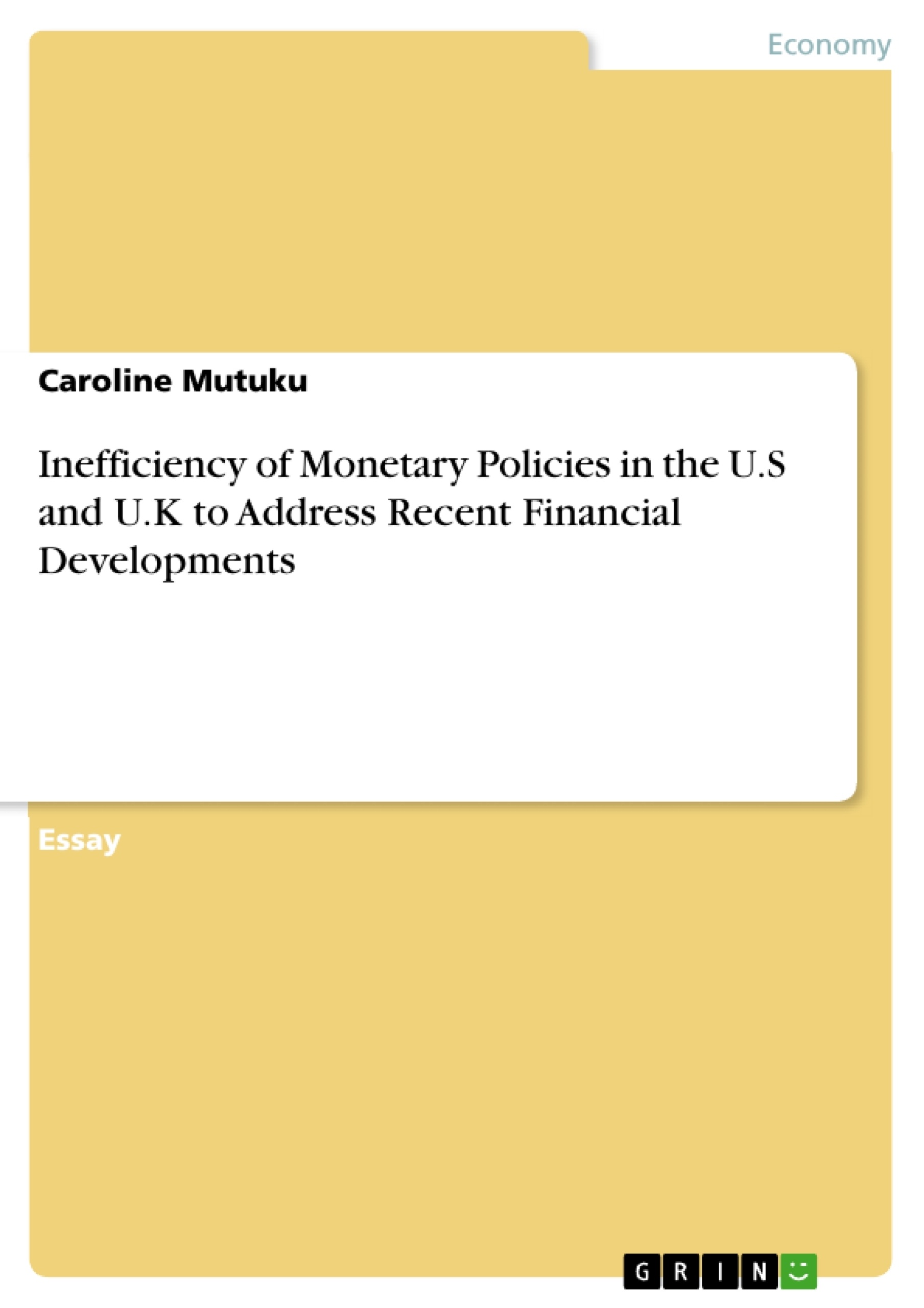Monetary policy refers to operations of regulatory authorities or central banks aimed at formulating the size as well as the rate of growth of the money supply. Usually, each country establishes a statutory financial institution with legal mandates to develop monetary policy as well as formulating appropriate monetary implementation strategies. The major role of any monetary authority is to control the country’s money supply. The country’s monetary authority is in charge of promoting economic growth and stability. As such, it deals with interest rates matters with the principal objective of establishing stable commodity prices as well as maintaining low rates of unemployment. However, it is important to note that monetary policy is different from the fiscal policy. Monetary policy controls the country’s supply of money whereas fiscal policy deals with taxation, money borrowing as well as government expenditure .
Inhaltsverzeichnis (Table of Contents)
- Inefficiency of Monetary Policies in the U.S and U.K to Address Recent Financial Developments
- United States Monetary Policy (Mixed Monetary Policy)
- Challenges of the United States Monetary Policy
- United Kingdom Monetary Policy
- Conclusion
Zielsetzung und Themenschwerpunkte (Objectives and Key Themes)
This paper examines the effectiveness of monetary policies in the United States and United Kingdom in addressing recent financial developments. It critiques the shortcomings of these policies and highlights the need for immediate economic measures to counteract the ongoing economic challenges.
- Inefficiency of monetary policies in the US and UK
- Challenges in implementing monetary policies
- Uncertainties in monetary policy decision-making
- Consequences of ineffective monetary policies
- Comparison of monetary policies in the US and UK
Zusammenfassung der Kapitel (Chapter Summaries)
- The paper begins by defining monetary policy and outlining its key elements. It then discusses the specific challenges of implementing monetary policy in the United States, focusing on the role of the Federal Reserve Bank of New York and its mechanisms for controlling the money supply. The paper notes that, despite efforts to ensure efficient transfer of funds, the US monetary policy has been inadequate in addressing current economic challenges.
- This chapter delves into the various uncertainties surrounding the US monetary policy, including the difficulty in obtaining accurate economic data, the limitations of economic variable estimates, and the lack of clear mechanisms for achieving stable commodity prices and maximum employment. The chapter argues that the current state of the US monetary policy is subject to criticism due to issues of accountability, opacity, and potential market distortion.
- The chapter examines the similarities and differences between the monetary structures of the United States and the United Kingdom. It highlights the challenges faced by the Bank of England in implementing monetary policy, suggesting that these challenges may be more significant than those encountered in the US. The chapter concludes by noting that the implementation process in the UK is less governed by law compared to the US.
Schlüsselwörter (Keywords)
The primary keywords and focus topics of this work include monetary policy, economic challenges, financial developments, US monetary policy, UK monetary policy, Federal Reserve, Bank of England, unemployment rates, commodity prices, economic crisis, monetary policy implementation, and economic measures.
Frequently Asked Questions
What is the main objective of monetary policy?
The primary role of a monetary authority, like a central bank, is to control the money supply to promote economic growth, maintain price stability, and keep unemployment rates low.
How does monetary policy differ from fiscal policy?
Monetary policy controls the supply of money and interest rates, whereas fiscal policy deals with government taxation, borrowing, and public expenditure.
What are the challenges for US monetary policy mentioned in the paper?
Challenges include difficulties in obtaining accurate economic data, market distortions, lack of transparency, and the inefficiency of the Federal Reserve in addressing recent financial developments.
How does the Bank of England's approach compare to the US Federal Reserve?
The paper suggests that the Bank of England faces even more significant implementation challenges and that the UK process is less governed by strict law than the US system.
Why is the accountability of monetary policy criticized?
Criticism often stems from the "opacity" of decision-making processes and the potential for regulatory authorities to distort markets through their interventions.
- Citation du texte
- Caroline Mutuku (Auteur), 2018, Inefficiency of Monetary Policies in the U.S and U.K to Address Recent Financial Developments, Munich, GRIN Verlag, https://www.grin.com/document/432460



